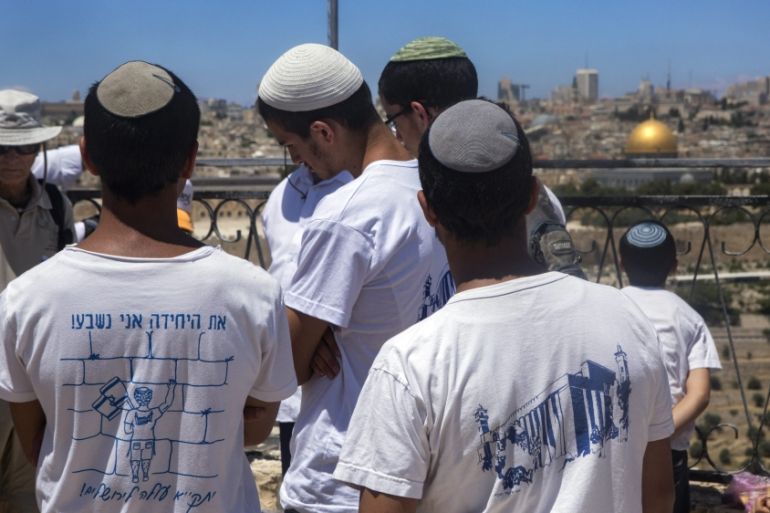Palestinians sceptical of French-led ‘peace talks’
Palestinians criticise efforts to revive negotiations that assume a symmetry between them and Israel at the table.

France’s initiative to revive “peace talks” between Palestinians and Israelis will not produce a just and effective resolution for Palestinians, activists and analysts told Al Jazeera.
“The fundamental reason why the two-decade long talks have failed is that they assumed there is symmetry between Israelis and Palestinians at the negotiating table, when in fact there’s no such symmetry,” said Tareq Baconi, a policy fellow at Al-Shabaka Palestinian Policy Network.
“But [the process set in motion by France] is unlikely to result in a just resolution. It regurgitates the same things that have failed over the past two decades to produce any effective resolution,” he told Al Jazeera.
Top representatives from 28 countries, the United Nations and the European Union convened in Paris on Friday in the first effort to revive talks between Israelis and Palestinians in two years.
OPINION – Peace is war: After the Oslo Accords
The French-led initiative is designed to lay the groundwork for a “peace conference” to be held later in the year with the participation of both Palestinian and Israeli negotiators, who are not attending the first meeting in Paris on Friday.
Leaders, including US Secretary of State John Kerry who led the last round of direct negotiations, will attempt to set out the parameters to resolve the core issues to work towards a final deal – including borders, security, refugees, Jerusalem, settlements and water.
While Hamas opposed the move, the French initiative received a warmer response from other segments of the Palestinian leadership.
“We are moving from a failed bilateral approach for negotiations, to a multilateral scheme whereby the international community must assume a responsibility,” Dr Saeb Erekat, Palestine Liberation Organization’s Secretary-General and chief Palestinian negotiator, wrote in a statement to Al Jazeera.
|
|
“What is needed is to define a mechanism and a clear timeframe to end the Israeli occupation as well as the implementation of international law and relevant UN resolutions for the solution of all final status issues, including the refugee issue,” the statement continued.
Palestinians, however, remain largely sceptical of the French move.
Mahmoud Nawajaa, a spokesman for the Palestinian BDS (Boycott, Divestment and Sanctions) National Committee, expressed his concern at France’s hosting of a meeting to pave the way for talks, while at the same time criminalising and persecuting BDS activists, whose strategy is to call on global civil society to exert pressure on Israel and Israeli society.
“If it wishes to take meaningful action towards a just peace, the French government should start by ending its severe repression of the BDS movement that it has implemented in order to shield Israel from being held to account,” Nawajaa told Al Jazeera, adding that any international initiative that ignores the Palestinian right of return as well as equality for Palestinian citizens of Israel is, in his view, doomed to fail.
A document disseminated by France on Tuesday said that leaders should agree on strict deadlines for the negotiations.
“Time is not a neutral factor given the steady erosion of the two-state solution. An open-ended approach would be oblivious to the reality on the ground and the constant risks of escalation,” the document, obtained by Israeli daily Haaretz, stated.
In the document, France called for “renewed international engagement” and the need for a “common assessment, that the two-state solution is the only option, that it is severely threatened and needs to be preserved”.
However, even peace activists such as Sulaiman Khatib, appear to pay little attention to France’s efforts saying the timing is “bad”.
|
|
“As a peace activist in the non-violent movement, of course I want to see leaders getting together [to discuss peace], but I don’t see an international, regional momentum for a real change here,” said Khatib, a member of Combatants for Peace, a group of Israelis and Palestinians founded by former soldiers and political prisoners.
“Peace with the Palestinians is not on the Israeli government’s agenda,” he told Al Jazeera.
For Nasser al-Barghouti, a 55-year-old businessman from Ramallah, the problem is “the ghettos and the privileges granted to settlers”.
“We have been waiting 23 years. What took the French so long? If they can do it, then I welcome any solution. But I need to see something happening on the ground to convince me,” al-Barghouti said.
Fayrouz Sharqawi, a long-term resident of Jerusalem originally from Nazareth, a Palestinian city in northern Israel, and coordinator at Grassroots Jerusalem, an NGO that promotes alternative tourism in the city, also believes France has little to offer. “I have no faith in peace initiatives that are so similar to previous ones, based on the two-state solution which is impossible now that Israel is already implementing one Zionist state in all of historic Palestine,” she argued.
Baconi shares the grim view. “Even if the meeting [on Friday] produces some sort of agreement about how to move forward with the negotiations, I am still sceptical it will result in an actual effective meeting [with the parties] in September,” he said.
“Israel is not seeking an agreement and the Palestinians need to figure out a strategy before they sit down at the negotiating table or history will repeat itself.”